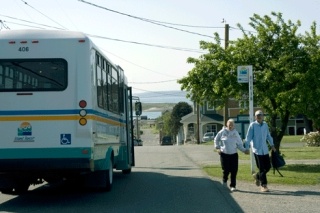Island Transit needs a cash infusion or the free bus system will be forced to cut its service up to 34 percent next year.
The shortage is partly a result of a puny 2 percent increase to the Island Transit $8,686,724 budget this year, said Martha Rose, executive director of Island Transit. Insurance, maintenance and other costs are rising at a larger rate, she said.
Sales tax revenue is also down, which is compounding the transit system’s financial trouble.
In an effort to maintain the same level of service for 2010, the Island Transit Board of Directors voted Monday to submit a proposed three-tenths of 1 percent sales tax increase on the August ballot.
The last time the voters approved a sales tax increase for Island Transit was May 2000, Rose said. It doubled from three-tenths to six-tenths of a percent after Island Transit lost funding from the vehicle excise tax.
If voters approve this new increase, the new tax will be nine-tenths of a percent — the maximum allowed — which Rose equates to an extra 30 cents on a $100 purchase.
“It’ll bring in an additional $2.5 million a year,” she said of the tax, if approved by voters in August.
According to board member Jim Palmer, the vote to place the tax increase on the August ballot was taken at a last-minute emergency meeting that was not advertised.
“I’m not happy that it came on such short notice,” Palmer said. “There was a lot of disagreement and a lot of discussion.”
Rose described the same meeting as a continuation of the May board session, adding that the board handled the difficult decision well.
“It was tough for the board,” she said. “To make a difficult decision like that, I really have to applaud them.
Rose said the tax increase request was delivered to the auditor’s office on Wednesday, six days before the deadline.
The Island County Auditor’s Office accepts resolutions for the Aug. 18 primary until May 26, according to the auditor’s Web site.
The idea of charging riders a fare for the service is not even a consideration, Rose said, adding that the money generated through ridership wouldn’t amount to much.
“The statistics and facts prove very little, if any, revenue is collected from fares,” she said, citing two studies. “If we could collect fares, we would have done it years ago.”
This way, the riders can decide the fate of the Island Transit offerings.
“The bottom line is, we don’t want our customers to suffer,” she said.
Island Transit’s next board of directors’ business meeting will be held on Friday, June 19, at 9:30 a.m. in room 131 of the Law and Justice Building, located at 101 NE Sixth Street, Coupeville.



